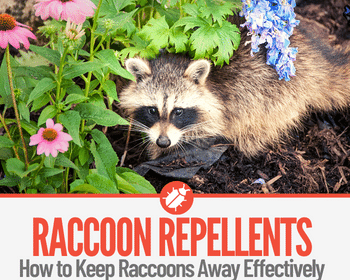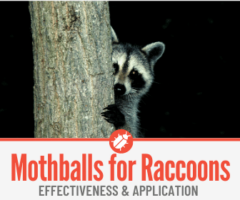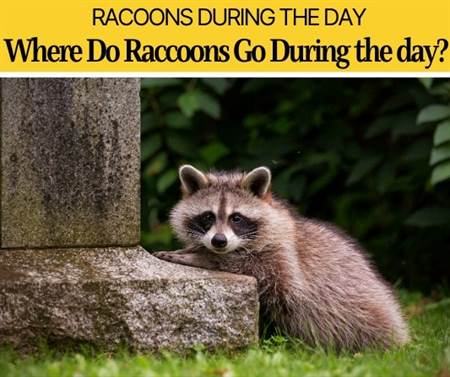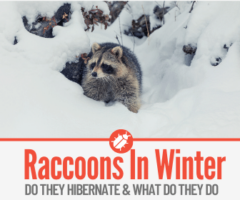 Struggling to keep the Masked Bandits away from your Yard? Wondering what are the best Raccoon Repellents that actually work to keep Raccoons away?
Struggling to keep the Masked Bandits away from your Yard? Wondering what are the best Raccoon Repellents that actually work to keep Raccoons away?
In this guide you will learn:
- What Smells Raccoons like and are attracted to,
- What are the best natural Raccoon repellents & How to Use them,
- How to Keep raccoons out of Garden or Trash & Get them to Leave Instantly.
Raccoons may look like fun, playful creatures, but they can wreak havoc on your house, yard, and garden.
They’ll eat whatever plants, vegetables, and fruits they can find, dig holes all over your grass to find grubs to eat, dig through your trash leaving a mess, and tear apart insulation in your attic to make their den.
Additionally, raccoons carry many diseases, including rabies, Parvo, and distemper, all diseases that can be fatal to both dogs and cats.
Best Raccoon Repellents
There are several ways to naturally deter & keep raccoons away, ranging from scent deterrents to physical methods.
The best Scent Repellents for Raccoons are Cayenne Pepper, Vinegar, Peppermint oil, Ammonia, Coyote Urine & Raccoon Eviction Fluid.
The best Physical Repellents to keep raccoons away are Motion-activated Sprinklers & Lights.
Raccoons hate scents that smell spicy, pungent, caustic, or sour. Raccoons mainly hate these kinds of scents because they interfere with their sense of smell and ability to locate by smell. They especially hate scents that smell like a predator or a human.
1.Cayenne Pepper
Cayenne pepper is a natural repellent for many types of pests, including raccoons, because it contains a substance called Capsaicin that gives the pepper its hot flavor.
Raccoons detest both the spicy smell and flavor of cayenne pepper, making it an easy and effective raccoon repellent. To make a cayenne pepper spray, mix a bottle of cayenne pepper or cayenne pepper flakes and 1 teaspoon of dish soap in a gallon sprayer.
Mix well and spray the solution on the ground or on plants in areas of raccoon activity to keep raccoons away. The dish soap helps the solution stick to plants and surfaces better.
While cayenne pepper is effective at irritating the raccoon’s sense of smell, the scent will need to be re-applied several times to be truly effective.
2.Black Pepper
Black pepper works as a great raccoon repellent for fruits in an orchard, garden, or yard because raccoons detest the spicy smell of the pepper.
To use as black pepper as a deterrent for raccoons, just sprinkle black pepper on the fruit still on the plants, the fruit on the ground, and on any other plants you want to protect. For best results, mix the black pepper with water and dish soap and use as a spray.
Just as with cayenne pepper, a black pepper spray will need to be re-applied to fully prevent raccoons from returning.
3.Onion and Pepper
A combination of onion and pepper releases an unappetizing, pungent smell that will deter raccoons but will also irritate them if they get too close.
While this scent is very effective at keeping raccoons away, just like with any scent, it will need to be re-applied continuously.
To make an onion and pepper repellent spray, boil equal amounts of onion and pepper in water and then transfer to a spray bottle when cooled.
4.Vinegar
Raccoons absolutely hate the smell of vinegar. The caustic, acidic smell overwhelms their senses and makes it hard for them to sense their surroundings.
Vinegar’s ability to dampen a raccoon’s senses is especially effective at night when raccoons rely almost solely on their heightened sense of smell to find food.
To use vinegar as a repellent for raccoons, spray vinegar on trash cans or any other area you want to protect, or soak old clothes or rags in vinegar and place them strategically where needed.
Any kind of vinegar will work as a deterrent, but raccoons especially hate apple cider vinegar for its extra potency.
5.Ammonia
The colorless gas ammonia works as a great raccoon repellent. When you smell ammonia, it’s pungent odor immediately takes away your breath, and it does the same to raccoons.
Not only will it be a shock for the raccoons, but it also disorients them by disrupting their senses. Because of its strong odor, ammonia is actually more effective than vinegar, but some people prefer not to use ammonia for its sharp, disrupting smell.
6.Garlic
Raccoons are extremely irritated by garlic because its strong smell disrupts their ability to detect food’s smell, and its taste lingers on their tastebuds and leaves them desensitized.
You can sprinkle crushed garlic cloves or garlic powder in areas where raccoons are often seen, such as in the garden and around trash cans to act as a raccoon repellent. To make a spray, mix garlic powder, dish soap, and water in a spray bottle and spray the mixture directly on plants or other surfaces.
For the best effect with garlic, add cayenne pepper to the spray mixture. As with any scent, the garlic mixture will have to be re-applied frequently to prevent the scent’s dilution and to keep raccoons away.
7.Peppermint Oil
Peppermint essential oil works great as a raccoon deterrent to get rid of raccoons because raccoons hate the permeating and cool, burning smell of peppermint.
To use as a spray, combine 4-5 drops of peppermint oil and a bit of rubbing alcohol in a spray bottle and fill the rest with water. The best place to use peppermint oil is inside the raccoon’s den if you can locate it.
In the den’s small spaces, the peppermint oil becomes overpowering, causing the raccoon to leave. Peppermint oil has a fairly long lasting period but still needs to be re-applied frequently, especially after rain.
8.Coyote Urine
Coyote urine is one of the most effective scent repellents for raccoons because it takes advantage of the predator-prey relationship.
Coyote urine tricks a raccoon into thinking that your property has already been claimed by a predator because when a predator claims a spot, the first thing it does is mark its territory by urinating along the perimeter.
This scent will discourage all raccoons, including both pregnant and nursing mothers. Other predator urine will also work, but coyote urine is often the most accessible.
Human urine will also work because after 24 hours, human urine turns into ammonia, a smell that raccoons hate. Additionally, raccoons hate the smell of any urine, even their own near their den because it eventually gives off an ammonia smell.
9.Raccoon Eviction Fluid
If you think that the raccoon on your property may be a female (whether pregnant or nursing), you can try raccoon eviction fluid as a scent repellent. Eviction fluid is a strong, replicated male raccoon scent.
Raccoon eviction fluid works as a deterrent because during the birthing period, female raccoons see male raccoons as a sort of predator, which makes any male scent appear as a threat to the safety of her kits (baby raccoons).
Often, the scent of another male raccoon will be enough to convince a nursing or pregnant mother to avoid your property in the future or to relocate her kits from your property.
10.Motion-activated Sprinkler
Water sprinklers are a great way to quietly and effectively scare off raccoons. However, instead of paying to have a water sprinkler on consistently, a motion-activated sprinkler works great because the raccoons don’t expect the surprise blast of water, and it saves you money by only going off when triggered.
While the sprinkler works great as a repellent and a scare tactic, it will only work long term when combined with other tactics such as smells and habitat modification.
11.Ultrasound Animal Repeller
This sound machine works by emitting certain sounds, distress calls, and frequencies that scare off Raccoons.
For example, the machine may give off sounds of another animal in distress, of a predator’s hunting sounds, or even sound frequencies that only certain animals can hear.
This technique is fairly effective in getting rid of raccoons, especially when combined with scent repellents.
12.Noises and Lights
Sudden loud noises and bright lights are a great way to repel raccoons because raccoons are so sensitive to their surroundings.
Sounds such as a human voice, a dog barking, or a car engine are all effective raccoon sound repellents.
Options can include a radio, motion-activated floodlights, or sound machines. If you are worried about disturbing your neighbors, you can get a sound machine that gives off noises only in a frequency that the raccoon can hear.
Note: You will need to apply the above mentioned scents repeatedly for them to be effective.
However, after using one scent for a while, switch the scent to prevent raccoons from becoming accustomed to just the one scent.
Additionally, spray the scent both outside where they are looking for food and inside wherever they are attempting to make their nest. This tactic reinforces the idea that all areas of your property are off limits.
Places to Apply the Scents & Deterrants
The scents listed above are safe for humans and will drive off raccoons, but only if applied in the right locations.
The best place to apply a scent deterrent is by a pantry, garden, trash can, food bins, crops, or anywhere else that food might be available.
Another great place is in your yard, but specifically on any plants, crops, vegetables, flowers, etc. that you don’t want them eating. These are easy foods for raccoons and without a deterrent, it will be impossible to keep them away.
Entry points and pathways that lead to areas of the house, barn, or garden are another important place to apply scents. This can include holes, wires, poles, fences, gutters, or anything they have to go through to get to food or a warm place to stay.
Apply scents on any place where a raccoon might build its nest. While these places can be hard for humans to reach, they are easy for raccoons.
- Often, these places include chimneys, attics, under decks, and any other small and hard to reach places.
- Spraying scents in the access points to each of these places will deter raccoons from entering and building nests or from returning to an existing nest.
Note that even if you use deterrents in other areas but not in the most common nesting areas, it will still be almost impossible to get rid of the raccoons.
Finally, you should place these repellents around the perimeter of your house and land to reinforce the idea that they are not welcome on any of your property.
If you only keep deterrents in specific areas of your home, they’ll just look for another area on your property.
Raccoon’s Sense of Smell is Incredibly good
Because raccoons are nocturnal and scavenge for food at night, they have very sensitive olfactory receptors that give them a heightened sense of smell. Raccoons rely on their sense of smell to navigate in the dark, discern what is around them, and find food.
Here are the smells that Raccoons are Attracted to
Raccoons love any smells that mean there is food nearby. They are attracted to smells of fruits, vegetables, meats, fish, and rotting food, or garbage.
Some fruits with smells they like include sweet fruits such as watermelons, strawberries, and apples. Because vegetables don’t have as strong of a sweet smell like fruit, they’re not as attracted to them.
However, raccoons like vegetables such as carrots and sweetcorn, and especially if drizzled with honey.
For meat and fish, the more potent the smell is, the more the raccoon is attracted to the scent.
Raccoons prefer meat and fish with a fatty meat scent, such as chicken, bacon, canned or fresh fish. Additionally, raccoons love the smell of fresh eggs, both whole and cracked.
Raccoons also love the scent of cat and dog food because it usually contains a mixture of meat, fish, and a sweet vegetable, such as corn.
Raccoon Repellents that Are Safe for Cats & Dogs
Trying to Get rid of raccoons without harming your own cats or dogs can be a battle. Below are some raccoon repellents that are effective at deterring raccoons but also safe for cats or dogs
- Motion-activated Sprinkler
The best raccoon repellent that is also safe for pets is a motion-activated sprinkler. The sudden blast of water will deter the raccoon without any harm to your cat or dog. Because cats don’t like water, they will learn to just stay away from the sprinkler. Dog’s won’t even be bothered by the water and might even enjoy it.
- Peppermint Pest Spray
Almost all animals hate the smell of peppermint, but especially raccoons. The minty, permeating smell hinders the raccoon’s sense of smell, burns its nose, and makes its eyes water. Because it is a natural oil, peppermint is a cat and dog safe but effective repellent for raccoons.
- Motion-sensor Lights
Another great option to deter raccoons without harming your pets is by installing motion-sensor lights.
The sudden flare of bright light will effectively scare away the raccoon. To save on power, you can even get solar-powered motion-sensor lights to install in your yard.
Tips to Keep Raccoons out of Your Garden
Raccoons are drawn to your garden because it houses ants, moths, fleas, beetles, flies, weevils, grubs, and other pests.
Thus, the best way to keep raccoons out of your garden and get rid of them is to reduce the number of pests for it to feed on by using beneficial nematodes.
These are colorless, microscopic roundworms commonly found in the soul that attack and control soil-born insect pests, but aren’t harmful to earthworms, animals, plants, or humans.
Another great way to keep raccoons out of your garden is by spreading epson salt throughout your garden. Epson salt works as both a natural fertilizer and a raccoon repellent
Epson salt is the best for your yard and garden because it works as both a fertilizer and a raccoon repellent because of its strong smell. For best results, sprinkle the epson salt inside the garden, around the plants, and outside along the edge of your garden.
Another way to keep raccoons out of your garden is by placing a fence around the garden. Anything from a normal wooden fence to an electric fence will effectively prevent raccoons from entering your garden.
Here’s How to Stop Raccoons from Digging Up Your Lawn….
Raccoons dig up lawns because they are looking for the food sources growing inside the lawn and soil. They mainly search for plants, insects, and grubs to eat.
The best way to prevent raccoons digging holes in your yard is to reduce the amount of grubs and larval insects in your yard. Grubs are the larvae beetle that provides the raccoon with many proteins and nutrients.
The best ways to stop raccoons is to make it hard for them to dig, to apply nematodes, aerate your lawn, keep your soil wet, spray with cayenne pepper, use a motion activated sprinkler, and lay chicken wire over the lawn.
Raccoons are persistent, but they won’t waste their effort without getting anything in return.
Thus, if you make it hard for them to find food and reduce the amount of food they can find, you’ll discourage them, and they will go elsewhere for food.
How to Keep Raccoons off Deck
To keep raccoons off of your deck, you should first eliminate the factors that drew the raccoon to your property. You can do this by removing food sources or trash that might be drawing them to your deck and sealing your trash cans.
If these methods don’t work, try the options below to raccoon-proof your deck.
1.Install Baffles
Baffles are metal cones that attach to the ends of your deck posts. With the baffles in place, raccoons will not be able to climb your deck posts because the smooth metal cone prevents the raccoon from gripping the post to climb upwards.
It is important to keep in mind that raccoons climb your deck posts often means they are looking for a way into your house or attic, or have already made a den inside.
Simply installing baffles may not be enough to prevent raccoons from returning.
2.Wrap Poles with Metal
Another option is to wrap your deck posts with a smooth metal, whether that is sheet metal, stove pipe, or any other form of a smooth metal surface.
When wrapping your poles, be sure to begin the metal wrapping 48 inches above the ground and 24 inches above any nearby railing, tree limbs, or anything else the raccoon can climb onto.
Raccoons are very smart and determined creatures. If they cannot climb the pole, they’ll often climb nearby structures, leap onto your posts, and continue climbing. However, if your poles are wrapped in metal at the right height, they will not be able to grip the post to climb up it.
3.Seal under Your Deck
If raccoons are on or around your deck regularly, then they’ve probably made their home under the deck. If so, they’ll spend most of their day under your deck and come out at night to scavenge for food.
If they’ve made their den under your deck, you’ll first need to get the raccoons out, then begin sealing your deck.
First, inspect your deck for any holes or gaps larger than 3 inches that the raccoon could sneak through. Then, seal all entrances with wire mesh and secure the mesh with large staples or screws.
If your deck is above the ground level, secure all entrances with wire mesh that extends at least 6 inches below the surface to prevent raccoons from digging their way in.
4.Install Lights or Sound
Another great way to keep raccoons off your deck is to install a motion-sensor light or sound system.
The sudden blast of light or sound will scare the raccoon into leaving your deck.
How to Keep Raccoons out of Trash
Since food is the main reason that brings raccoons to your property, securing your trash can will go a long ways it repelling raccoons and keeping them away from your trash.
One way you can do this is through raccoon-repelling trash bags. These bags have a mix of corn mint oil, methyl salicylate, camphor oil, and eucalyptus oil in their lining.
These strong scents mixed together mask the trash’s natural scent, preventing raccoons from finding it as easily. Additionally, even if the raccoon still finds the trash can, he will be repelled by the bag’s minty smell.
Another option is to secure the can itself. You can buy trash cans that are made to prevent animals from getting inside, or you can make raccoon-proof the can yourself by stretching a bungee cord from one handle to the other and securing it.
Finally, you can also put a garbage can fence or rack around your cans to prevent raccoons from flipping the can over to get inside.
Raccoon Latrine Deterrent
While you’ve probably never heard of a raccoon latrine, they are real and dangerous.
Raccoons will determine a specific place as their latrine to deposit all their feces in one spot.
You want to avoid having a raccoon latrine on your property for more than just discomfort. Raccoon roundworms live inside the raccoon’s intestines and deposit roundworm eggs in the raccoon’s feces.
In just one day, a raccoon roundworm can deposit more than 100,000 eggs. Thus, depending on how many worms the raccoon has in its intestine, a raccoon can dispose of millions of eggs in just one day.
Once the eggs are deposited into the soil, the eggs develop into an infectious form within 2 to 4 weeks and can survive in the soil for years.
If these eggs are accidentally ingested by either humans or other animals, the egg will hatch into a larvae that moves into the host’s organs.
As the larvae travels through the host’s body, it can cause eye disease, spinal cord and brain damage, and in some cases, death. While infections from raccoon roundworms are rare, they can be quite dangerous.
The best way to prevent a raccoon latrine is to prevent raccoons from frequenting your property in the first place. However, if you find a raccoon latrine on your property, keep children and pets away from it until properly cleaned.
The area will need to be cleaned with special precautions and protective gear to avoid stirring up dust and contaminating other areas.
When choosing their latrine, raccoons generally prefer places that are off the ground, but they will also use the base of trees and sometimes an open wooded area.
Common places for raccoon latrines include roofs, decks, unsealed attics, tree forks, fence lines, woodpiles, sand boxes, logs, and large rocks.
Steps to Clean a Raccoon Latrine
- Wear disposable gloves and rubber boots that can be immediately disposed of or left outside.
- Lightly mist the latrine area with water to prevent dust.
- Use a shovel or scooper to lift the feces and place them in a heavy-duty disposable garbage bag. Note: never use a leaf blower or vacuum cleaner because both will blow the eggs up into the air.
- Tie the garbage bag with a twist tie or tape and double bag.
- Place the bag in a sealed garbage can that raccoons cannot get into.
- Disinfect any hard, smooth surface with boiling water. Most chemicals do not kill roundworms. If outside, and the soil is heavily contaminated, then remove the top 2 to 4 inches of soil and replace with new soil. The contaminated soil should be discarded at a landfill disposal site.
Ways that You Can Scare Raccoon Instantly to Leave
To scare a raccoon into instantly leaving, you want to startle the animal through loud noises, bright lights, intimidating movements, and water.
First, if you see a raccoon and need to scare it off, it is best to make sure you are fully covered. A scared raccoon will often retaliate, and you should have your hands, arms, and legs protected from bites and scratches.
One way to scare a raccoon into instantly leaving is to spray it with a hose, especially one that has a sprayer on the end. While raccoons are aquatic animals able to swim easily, they are very threatened by water on land.
A forceful gust of water from a hose will often be enough to scare the raccoon into instantly leaving.
Another way is to scare the raccoon through loud noises such as banging pots and pans or yelling. Other noises that raccoons hate include wind chimes, predator sounds, and radios that play human voices.
Additionally, you can scare a raccoon into instantly leaving through bright lights. Because. They are nocturnal animals who spend most of their time in the dark, sudden bright lights scare them and make them scurry away in fear.
Motion-sensor floodlights are the best for scaring off raccoons because they provide a sudden, blast of blinding light, scarring the raccoon and making them instantly run away in fear.
Smoke is another great option for scaring off raccoons. Just like humans, raccoons are afraid of fire, and smoke is a natural by-product of fire.
Often, even just a small amount of smoke, such as from a cigarette will be enough to scare a raccoon away from the immediate area.
Finally, intimidating movements are another great way to scare off raccoons.
Adopting a wide, offensive stance can sometimes be enough to scare away a raccoon. However, waving a long stick, such as a bat or a broom is often the best way to intimidate the raccoon into leaving.
Other Ways to Get Rid of Raccoons & Deter from Your Property
Since raccoons rely on their sense of smell to find food, scent deterrents work great for preventing raccoons and for getting them to leave your property.
However, they are only a short term resolution. If you do not consistently apply the scent or actively remove the temptations, such as food or open entry points, the raccoons will eventually return when the scent decreases, and they have become accustomed to the scent.
Habitat Modification
The best way that these scents work is when combined with habitat modification. Raccoons are opportunistic animals.
As long as they have easy access to foods, they can make any place their home and can, over time, become accustomed to almost any smell.
- Get Rid of smell
Once you have gotten the raccoon to leave, get rid of any smells that would invite it back. Seal trash cans, food bins, and any other access points to food that a raccoon might find.
These animals can dig through or squeeze though the smallest and most inaccessible pathways to find food.
If you don’t seal the food sources that are attracting the raccoons, no scent in the world will be able to keep them out permanently. They’re so driven by their stomachs that they will even tolerate a scent they hate just to get the food.
- Close all entry points
The next step is to prevent raccoons from entering your property again by barring them access. You must seal every entry point so that when the scents wear off, the raccoons will not be able to enter again.
Start with the chimney, sealing it with a cap that has small holes in it to only let out air. Then seal air vents, broken windows, garage doors, shingles, gaps near your chimney, and your roof.
Even if the area looks too small for an animal to fit through, seal it. Raccoons are determined animals and can squeeze into the smallest of places.
In Conclusion
Habitat Modification and DIY repellent sprays are a great way to naturally and inexpensively get rid of raccoons on your property.
The best homemade DIY raccoon repellent spray recipe is the hot pepper and cayenne taste spray. To make this spray, combine 1 bottle of hot pepper sauce, 1 bottle of cayenne pepper powder, and 1 teaspoon of dish soap in a 1 gallon spray bottle.
Mix well and spray wherever raccoons most frequent and in areas you want to prevent raccoons from entering, such as your attic, garage, and garden.






